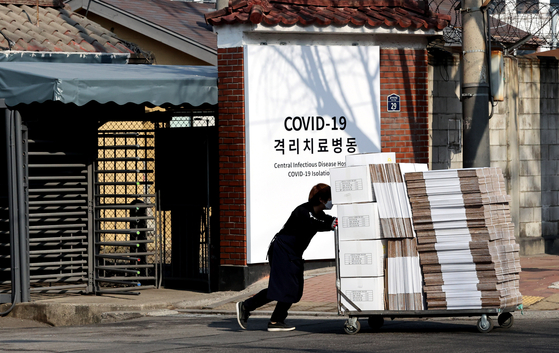
On the morning of the 21st, an official is moving medical supplies to the Central Vaccination Center at the National Medical Center in Jung-gu, Seoul. Vaccination against the novel coronavirus infection (Corona 19) is scheduled to begin on the 26th. yunhap news
With the new coronavirus infection (Corona 19) vaccination scheduled to start on the 26th, more than 9 out of 10 primary vaccination targets hoped to receive the vaccine. It is expected that the formation of collective immunity will be possible only after agreeing to.
According to the Central Defense Response Headquarters (Bangdaebon), there are 36,6959 residents and workers under the age of 65 in national nursing hospitals and facilities, mental care and rehabilitation facilities, and corona19 patient treatment hospitals registered as targets for vaccination as of 0:00 on the 20th. Of these, 93.8%, or 340,4181, agreed to vaccination. This is the result of confirming the number of vaccinations after pre-registration of the vaccination targets at 5873 facilities nationwide by the local public health center.
The first dose is scheduled to begin on the 26th. Of the 367,000 people, 54,000 will receive the Pfizer vaccine and the rest will receive the AstraZeneca vaccine. AstraZeneca’s vaccine-preventing effect, as revealed by pharmaceutical companies, is 62-70%, and Pfizer’s vaccine is about 95%. If each person said they would get the vaccine, 2,2489 AstraZeneca vaccine targets and 52,164 Pfizer vaccine targets, up to 25,4653 people will be immunized. It is about 0.5% of the total population of Korea, 52 million.

AstraZeneca vaccine is being checked by officials at the Gwanak-gu Health Center in Seoul on the afternoon of the 19th, when the second pan-government integrated simulation training was held for the new coronavirus infection (Corona 19) vaccine distribution. News 1
The quarantine authorities have said that population immunity can be formed only when 70% of the total population has antibodies. In an emergency questionnaire held by the National Assembly in January, Chung Eun-kyung, head of the Korea Centers for Disease Control and Prevention, said, “If about 60-70% of the entire population acquires immunity (collective immunity) is possible.”
The government has set a goal to form group immunity by November after starting vaccinations to nursing hospitals, medical welfare facilities for the elderly, and workers in high-risk medical institutions, and completing the first vaccination of 70% of the population by September. At least 36.4 million of Korea’s population need to be vaccinated. According to the current vaccination plan, if the population under the age of 18 is excluded from vaccination, 79% of the population subject to vaccination is about 46 million to get the vaccine.
However, this is when the preventive effect of the currently developed vaccine is 100%. Looking at the preventive effects of each of the five vaccine types that will enter Korea, AstraZeneca is 62-70%, Janssen is 66%, NovaVax is 89.3%, Modena is 94.1%, and Pfizer is 95%. Considering the effectiveness of the vaccine, collective immunity is possible only when all 100% of the vaccinated population receive the vaccine. If the average preventive effect of the vaccine is simply calculated as 80%, it is possible to achieve 70% collective immunity only when 46.2 million people of the entire population get the vaccine.

Kwon Deok-cheol, the first deputy head of the Central Disaster and Safety Countermeasures Headquarters (Minister of Health and Welfare), announced a social distancing adjustment plan that will be applied starting next week to prevent the spread of the novel coronavirus infection (Corona 19) at the joint briefing room of the government office in Jongno-gu, Seoul. have. Newsis
According to the’Corona 19 Vaccination Intention Survey’ announced by Gallup Korea on December 29, last year, 87% of the survey targets are expected to be introduced sooner as a result of an interview survey of 1,500 people aged 19 and over on November 5 to 29 last year. 19 He said he said he would get the vaccine. Professor Kim Yoon of the Department of Medical Management at Seoul National University said, “If 87% of the vaccination targets are vaccinated, 60% of the total population will be correct, but the number of successful immunizations will be less than that. The percentage is low, and considering mutant viruses, about 90% of the population must get a vaccine to be immunized.”
The quarantine authorities are in a position to continue to persuade the need for vaccination. Minister of Health and Welfare Kwon Deok-cheol appeared on KBS News on the 21st and said, “Because vaccination must be administered with the consent of the person, it cannot be enforced.” “Since the results of (significant clinical trial statistics) will come out within March in Europe and the United States, the vaccination again I will make it possible to start.”
Reporter Lee Tae-yoon [email protected]
